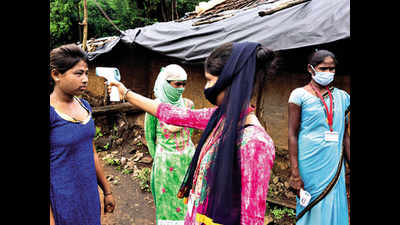- News
- City News
- ahmedabad News
- Gujarat: Patriarchy blocks women’s access to healthcare
Trending
This story is from May 25, 2021
Gujarat: Patriarchy blocks women’s access to healthcare
Nirmala (name changed to protect identity), a 33-year-old living in Patadi village of Gujarat contracted Covid five days after her husband got the infection.

Gender discrimination and suppression have viscerally existed in the state
AHMEDABAD: Nirmala (name changed to protect identity), a 33-year-old living in Patadi village of Gujarat contracted Covid five days after her husband got the infection. She looked after her husband, prepared his meals, washed his clothes and utensils while he rested and recuperated. She had no choice. However, when she was in need of care, her father-in-law called her parents, and asked them what must be done about it.
Another woman in the village, Kokila (not her real name), was nearly starving since her father-in-law died of Covid.When an ASHA worker in Patadi checked her oxygen levels, they were plunging to 90. Despite complaining, Kokila’s symptoms were ignored by her family and today she’s battling for life against Covid.
The accounts of Kokila and Nirmala are among the few documented in an ongoing study by a Gujarat-based NGO, Society for Women’s Action and Training Initiative (SWATI). The aim is to evaluate the impact of the pandemic on girls and women in rural areas. “The study is being undertaken across villages in three districts of Gujarat — Patan, Surendranagar, and Mahisagar,” said Poonam Kathuria, director, SWATI. “We have interviewed a cross-section of people including ASHA workers, Covid survivors, and women in villages. Distressing stories of gender discrimination have come to the fore.”
Gender discrimination and suppression have viscerally existed in the state. Adding a pandemic to the imbalanced equation is forcing women like Nirmala to literally fight for survival, according to the study.
Women often do not get tested despite symptoms. “They are instead made to drink hot water and herbal concoctions, and to take medicines and continue with their chores,” said Jashodaben Bhil, a resident of Radhanpur village who works as a counsellor with SWATI and is aiding the study. “They are made to do all the household work, not allowed to rest, and are stigmatized,” Jashodaben said. “That worsens their health.”
Jashodaben went on to say: “We have come across cases in which women, whose husbands are Covid positive, are made to stay with them and clean after them.” She added: “In turn, the women are often at risk of infection but their need for treatment will not be taken care of.”
According to ASHA workers, nutrition and food intake of families have suffered, the study says. “There have been increased complaints of anaemia, malnutrition and miscarriages over the past year,” the study says. “In a family with an infected member, the needs of a pregnant woman too are neglected.”
Another woman in the village, Kokila (not her real name), was nearly starving since her father-in-law died of Covid.When an ASHA worker in Patadi checked her oxygen levels, they were plunging to 90. Despite complaining, Kokila’s symptoms were ignored by her family and today she’s battling for life against Covid.
The accounts of Kokila and Nirmala are among the few documented in an ongoing study by a Gujarat-based NGO, Society for Women’s Action and Training Initiative (SWATI). The aim is to evaluate the impact of the pandemic on girls and women in rural areas. “The study is being undertaken across villages in three districts of Gujarat — Patan, Surendranagar, and Mahisagar,” said Poonam Kathuria, director, SWATI. “We have interviewed a cross-section of people including ASHA workers, Covid survivors, and women in villages. Distressing stories of gender discrimination have come to the fore.”
Gender discrimination and suppression have viscerally existed in the state. Adding a pandemic to the imbalanced equation is forcing women like Nirmala to literally fight for survival, according to the study.
“The plight of daughters-in-law in village families is even worse as they’re stigmatized for risking the entire household,” reveal the findings.
Women often do not get tested despite symptoms. “They are instead made to drink hot water and herbal concoctions, and to take medicines and continue with their chores,” said Jashodaben Bhil, a resident of Radhanpur village who works as a counsellor with SWATI and is aiding the study. “They are made to do all the household work, not allowed to rest, and are stigmatized,” Jashodaben said. “That worsens their health.”
Jashodaben went on to say: “We have come across cases in which women, whose husbands are Covid positive, are made to stay with them and clean after them.” She added: “In turn, the women are often at risk of infection but their need for treatment will not be taken care of.”
According to ASHA workers, nutrition and food intake of families have suffered, the study says. “There have been increased complaints of anaemia, malnutrition and miscarriages over the past year,” the study says. “In a family with an infected member, the needs of a pregnant woman too are neglected.”
End of Article
FOLLOW US ON SOCIAL MEDIA










